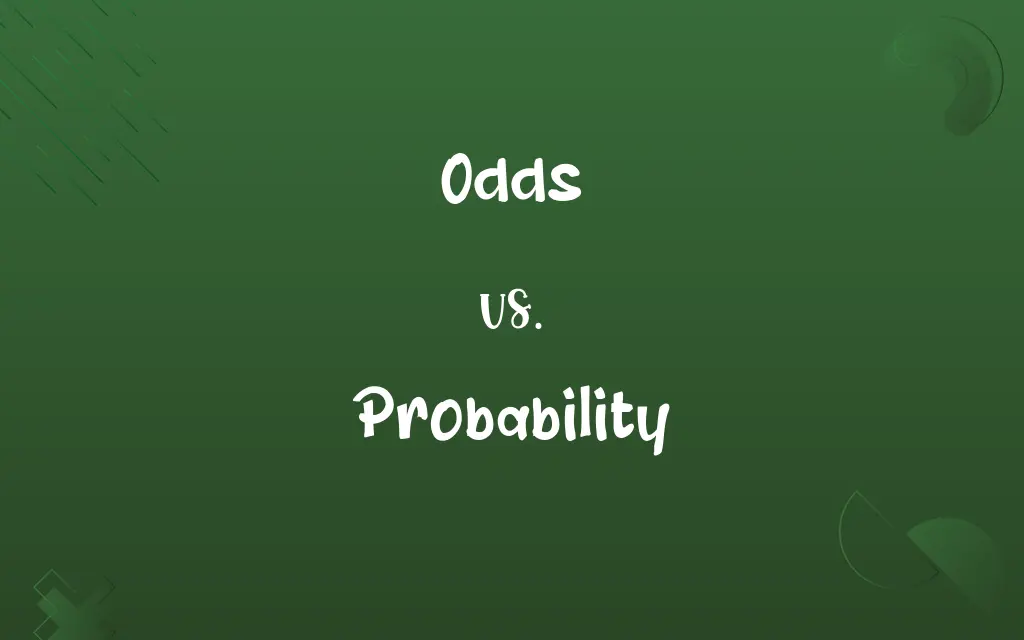Odds vs. Probability: Know the Difference

By Shumaila Saeed || Updated on December 25, 2023
Odds compare the likelihood of an event happening to it not happening, while probability measures the likelihood of an event occurring out of all possible outcomes.

Key Differences
Odds represent the ratio of the likelihood of an event occurring to it not happening. For example, if an event has odds of 3 to 1, it means there are three chances for the event to happen and one chance for it not to. Probability, on the other hand, is a measure of the likelihood that an event will occur, expressed as a fraction of all possible outcomes. In the same example, the probability would be calculated as the number of favorable outcomes divided by the total number of outcomes.
Shumaila Saeed
Dec 21, 2023
The calculation of odds is different from probability. Odds are often used in gambling contexts and are usually expressed in pairs of numbers. They highlight the relative chances of occurrence versus non-occurrence. Probability, in contrast, is a fundamental concept in statistics and mathematics, providing a scale from 0 to 1 (or 0% to 100%) where each number represents the degree of certainty of an event happening.
Shumaila Saeed
Dec 21, 2023
In interpreting odds and probability, a high odds value indicates a less likely event, while low odds suggest a more likely event. With probability, the closer the value is to 1 (or 100%), the more likely the event is to occur. A probability close to 0 means the event is less likely to happen.
Shumaila Saeed
Dec 21, 2023
Odds can sometimes be more intuitive in everyday language, especially in contexts like betting. They provide a straightforward comparison between the occurrence and non-occurrence of an event. Probability, however, is often more useful in scientific and statistical contexts for its precise and standardized approach to measuring likelihood.
Shumaila Saeed
Dec 21, 2023
To convert odds to probability, one can use the formula: Probability = Odds / (1 + Odds). Conversely, to convert probability to odds, the formula is: Odds = Probability / (1 - Probability). This mathematical relationship underscores how both concepts, while different, are interconnected in quantifying likelihoods.
Shumaila Saeed
Dec 21, 2023
ADVERTISEMENT
Comparison Chart
Definition
Ratio of likelihood of an event happening to not happening.
Measure of likelihood of an event occurring out of total possibilities.
Shumaila Saeed
Dec 21, 2023
Expression
Often in pairs of numbers (e.g., 3 to 1).
As a fraction, decimal, or percentage (e.g., 0.75 or 75%).
Shumaila Saeed
Dec 21, 2023
Contexts
Common in gambling and betting.
Widely used in statistics and science.
Shumaila Saeed
Dec 21, 2023
Interpretation
High value means less likely event.
Value closer to 1 indicates higher likelihood.
Shumaila Saeed
Dec 21, 2023
ADVERTISEMENT
Odds and Probability Definitions
Odds
Ratio of the likelihood of an event occurring to not occurring.
The odds of winning the lottery are extremely low.
Shumaila Saeed
Dec 14, 2023
Probability
The likelihood of something happening or being the case.
There is a high probability of rain tomorrow according to the forecast.
Shumaila Saeed
Dec 14, 2023
Odds
A representation of the balance between success and failure.
He succeeded against all odds.
Shumaila Saeed
Dec 14, 2023
Probability
The degree of certainty or uncertainty regarding the occurrence of an event.
The probability of a coin landing on heads is 50%.
Shumaila Saeed
Dec 14, 2023
Odds
A measure used in betting to represent the chance of a particular outcome.
The odds were in favor of the underdog in yesterday's match.
Shumaila Saeed
Dec 14, 2023
ADVERTISEMENT
Probability
A quantifiable measure used to express the chance of occurrence of a particular event.
The probability of rolling a six on a dice is 1/6.
Shumaila Saeed
Dec 14, 2023
Odds
A numerical expression of the likelihood of a specific event.
The odds of flipping a coin and getting heads are 1 to 1.
Shumaila Saeed
Dec 14, 2023
Probability
A branch of mathematics concerned with the analysis of random phenomena.
Probability theory helps in understanding complex statistical data.
Shumaila Saeed
Dec 14, 2023
Odds
The chances or likelihood of something happening or being the case.
The odds of it raining today seem quite high.
Shumaila Saeed
Dec 14, 2023
Odds
The ratio of the probability of an event happening to that of it not happening.
I'd say the odds are strongly in favor of the sun rising tomorrow morning.
Shumaila Saeed
Dec 13, 2023
Probability
A probable situation, condition, or event
Her election is a clear probability.
Shumaila Saeed
Dec 13, 2023
Probability
The likelihood that a given event will occur
Little probability of rain tonight.
Shumaila Saeed
Dec 13, 2023
Odds
(chess) An advantage given to a weaker opponent in order to equalize the game when playing casually, usually by removing one of the stronger player's pieces or by giving the weaker player more time.
She beat me with knight odds but lost with rook odds.
The grandmaster gave his opponents significant time odds, of one minute versus ten minutes.
Shumaila Saeed
Dec 13, 2023
Probability
(Statistics) A number, ranging from zero to one, expressing either the projected likelihood that a specific event will occur or the observed ratio of the number of actual occurrences to the number of possible occurrences.
Shumaila Saeed
Dec 13, 2023
Odds
Difference in favor of one and against another; excess of one of two things or numbers over the other; inequality; advantage; superiority; hence, excess of chances; probability. The odds are often expressed by a ratio; as, the odds are three to one that he will win, i. e. he will win three times out of four
The oddsIs that we scarce are men and you are gods.
There appeared, at least, four to one odds against them.
All the odds between them has been the different scope . . . given to their understandings to range in.
Judging is balancing an account and determining on which side the odds lie.
Shumaila Saeed
Dec 13, 2023
Odds
Quarrel; dispute; debate; strife; - chiefly in the phrase at odds.
Set them into confounding odds.
I can not speakAny beginning to this peevish odds.
Shumaila Saeed
Dec 13, 2023
Probability
(mathematics) A number, between 0 and 1, expressing the precise likelihood of an event happening.
The probability of an event A occurring is denoted P(A).
Shumaila Saeed
Dec 13, 2023
Odds
The ratio by which one better's wager is greater than that of another;
He offered odds of two to one
Shumaila Saeed
Dec 13, 2023
Probability
The quality or state of being probable; appearance of reality or truth; reasonable ground of presumption; likelihood.
Probability is the appearance of the agreement or disagreement of two ideas, by the intervention of proofs whose connection is not constant, but appears for the most part to be so.
Shumaila Saeed
Dec 13, 2023
Probability
That which is or appears probable; anything that has the appearance of reality or truth.
The whole life of man is a perpetual comparison of evidence and balancing of probabilities.
We do not call for evidence till antecedent probabilities fail.
Shumaila Saeed
Dec 13, 2023
Probability
A measure of how likely it is that some event will occur;
What is the probability of rain?
We have a good chance of winning
Shumaila Saeed
Dec 13, 2023
Probability
The extent to which an event is likely to occur, measured by the ratio of favorable cases to the whole number of cases possible.
The probability of drawing an ace from a standard deck of cards is 1/13.
Shumaila Saeed
Dec 14, 2023
Repeatedly Asked Queries
How are odds different from probability?
Odds are typically expressed as a ratio, while probability is expressed as a percentage or decimal between 0 and 1.
Shumaila Saeed
Dec 21, 2023
What is the formula to convert odds to probability?
To convert odds to probability, use the formula: Probability = (Odds for) / (Odds against + Odds for).
Shumaila Saeed
Dec 21, 2023
What do "odds against" mean?
"Odds against" represent the likelihood of an event not happening, indicating that the event is less likely to occur than not.
Shumaila Saeed
Dec 21, 2023
What are odds?
Odds are a way to express the likelihood of an event happening, typically as a ratio of the probability of success to the probability of failure.
Shumaila Saeed
Dec 21, 2023
What does "even odds" mean?
"Even odds" means that the likelihood of an event happening is 50%, or a probability of 0.5.
Shumaila Saeed
Dec 21, 2023
How do you calculate the expected profit from odds?
To calculate the expected profit, multiply the amount you could win by the probability of winning, and subtract the amount you bet.
Shumaila Saeed
Dec 21, 2023
What do "odds in favor" mean?
"Odds in favor" represent the likelihood of an event happening, indicating that the event is more likely to occur than not.
Shumaila Saeed
Dec 21, 2023
Are odds always expressed as a ratio?
Yes, odds are typically expressed as a ratio, such as 2:1 or 3:2.
Shumaila Saeed
Dec 21, 2023
What is probability?
Probability is a measure of the likelihood of an event happening, expressed as a number between 0 (impossible) and 1 (certain).
Shumaila Saeed
Dec 21, 2023
How is probability calculated for simple events?
For simple events, probability is calculated as the number of favorable outcomes divided by the total number of possible outcomes.
Shumaila Saeed
Dec 21, 2023
What is the difference between theoretical and experimental probability?
Theoretical probability is based on mathematical calculations, while experimental probability is based on observed outcomes from experiments or data.
Shumaila Saeed
Dec 21, 2023
What are the odds of a certain event if the probability is 0?
If the probability of an event is 0, the odds against that event are infinite.
Shumaila Saeed
Dec 21, 2023
What does "mutually exclusive" mean in probability?
Events are mutually exclusive if they cannot occur at the same time. The probability of both mutually exclusive events happening is 0.
Shumaila Saeed
Dec 21, 2023
What does it mean if the probability of an event is 1?
If the probability of an event is 1, it means the event is certain to occur.
Shumaila Saeed
Dec 21, 2023
What is the complement rule in probability?
The complement rule states that the probability of the complement (opposite) of an event is 1 minus the probability of the event itself.
Shumaila Saeed
Dec 21, 2023
How do you calculate the probability of independent events?
For independent events, you multiply the probabilities of each event to find the combined probability.
Shumaila Saeed
Dec 21, 2023
What is the law of large numbers in probability?
The law of large numbers states that as the number of trials or experiments increases, the experimental probability tends to approach the theoretical probability.
Shumaila Saeed
Dec 21, 2023
What is conditional probability?
Conditional probability is the probability of an event occurring given that another event has already occurred.
Shumaila Saeed
Dec 21, 2023
Share this page
Link for your blog / website
HTML
Link to share via messenger
About Author
Written by
Shumaila SaeedShumaila Saeed, an expert content creator with 6 years of experience, specializes in distilling complex topics into easily digestible comparisons, shining a light on the nuances that both inform and educate readers with clarity and accuracy.








































































